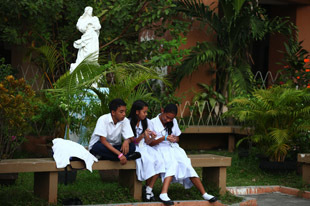 Photo: Matt Cashore
Photo: Matt Cashore
Religion is a key factor — for good and for ill — affecting security around the world, from Iraq and Iran to Pakistan and Israel-Palestine. It also plays a leading role in many other conflicts, including those in Congo, Sudan, and Colombia. Serious attention to religious actors and dynamics in world affairs is long overdue.
Posts in the October 2012 issue of Peace Policy:
Gerard F. Powers suggests ways for the U.S. to engage with global religious actors, who are often forces for peace and justice. Read »
Scott Appleby explains the role of religious leaders in supporting the new Framework Agreement in Mindanao, the Philippines. Read »
Sumanto Al Qurtuby provides a successful example of grassroots peace activism by religious women in Indonesia. Read »
About Peace Policy
Peace Policy offers research-based insights, commentary, and solutions to the global challenge of violent conflict. Each issue features the writing of scholars and practitioners who investigate the causes of violent conflict and who seek to contribute to effective solutions and alternatives to the use of force.
Peace Policy is edited by David Cortright, director of policy studies at the Kroc Institute, dcortrig@nd.edu.
Visit the latest issue of Peace Policy at peacepolicy.nd.edu